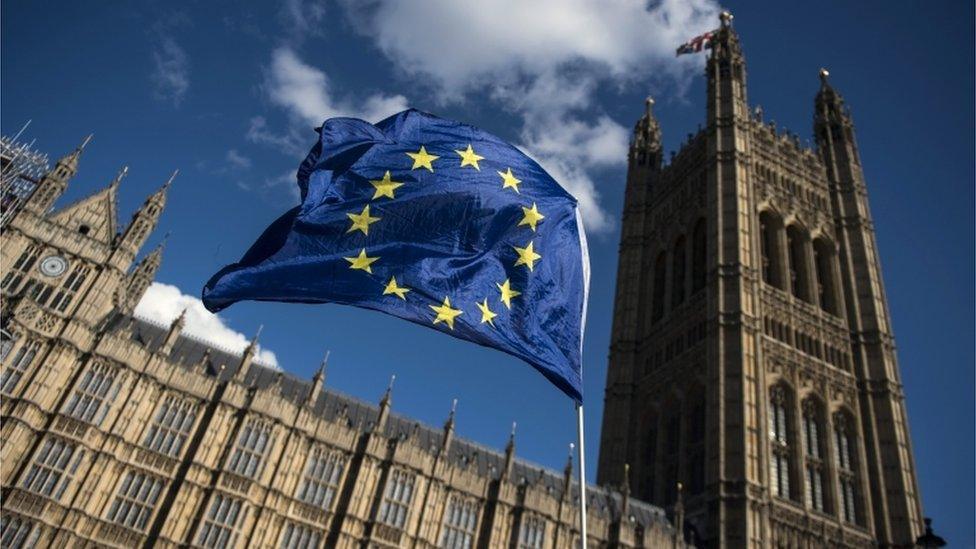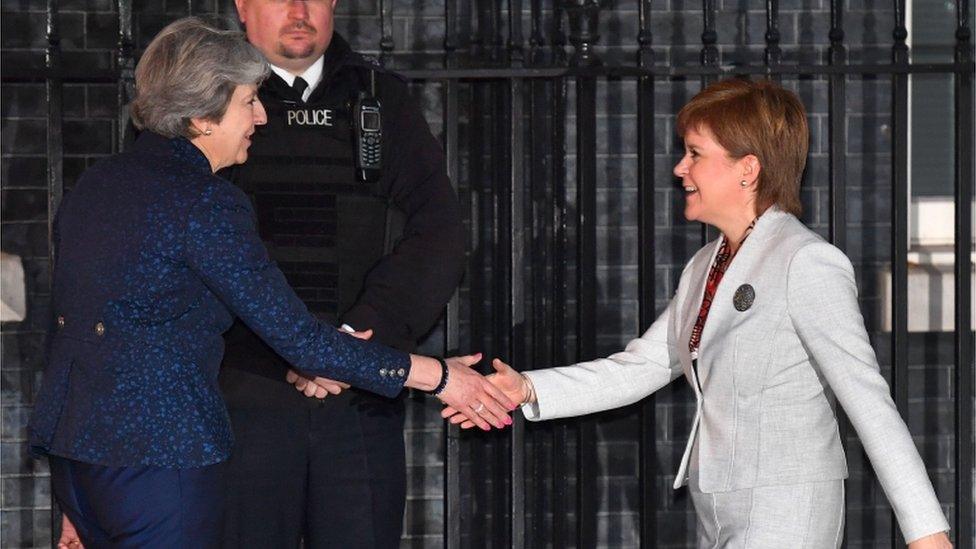MPs call for clarity over devolved powers after Brexit
- Published

The committee's recommendations were unanimously agreed by its members
A cross-party committee of MPs has united to call on the UK government to set out which powers will be devolved to Scotland after Brexit.
The Scottish Affairs Committee said the move was needed to end the stalemate between the UK and Scottish governments over the EU Withdrawal Bill.
And it said it needed to be done before MPs vote on the bill in the House of Commons.
The committee has members from the SNP, Conservatives, Labour and Lib Dems.
The deadlock over the Brexit bill centres on what happens to powers in devolved areas such as fishing, farming and the environment that will return from Brussels once the UK leaves the EU.
It was the main topic during a Downing Street meeting between Prime Minister Theresa May and First Minister Nicola Sturgeon on Tuesday.
In its report, the Scottish Affairs Committee called for agreement to be reached on which of the powers will be devolved directly to the Scottish and Welsh parliaments, and which will become part of UK-wide frameworks.
The report, which was unanimously agreed by committee members, said the presumption should be that all of the powers "should be devolved unless there is good reason to reserve them".
'Reached by agreement'
It called on the UK government to publish the outcome in time for the final Commons stage of the bill, to give MPs clarity about how it will affect Scotland's devolution settlement before they vote on it.
And it said that UK-wide common frameworks in currently devolved policy areas should be "reached by agreement between the UK government and the governments of Scotland, Wales and Northern Ireland, where relevant, and not imposed by Westminster".
The committee has four members from the Conservatives, three from each of the SNP and Labour, and a single Liberal Democrat.

What is the row over the Brexit bill about?

Theresa May and Nicola Sturgeon failed to reach an agreement on the Brexit bill in their talks on Tuesday
The EU Withdrawal Bill states that responsibilities in devolved areas such as agriculture, fishing and the environment that currently reside in Brussels will all return to Westminster rather than Edinburgh or Cardiff immediately after the UK leaves the EU.
The UK government insists this is just a transitional arrangement, and that many of these responsibilities will then be devolved - but has not yet specified which ones.
The Scottish and Welsh governments argue that the powers should automatically go directly to the devolved parliaments under the UK's devolution settlement.
They have said they will withhold legislative consent for the bill in their respective parliaments until the dispute over the repatriation of powers from Brussels is resolved.
A series of talks between the two sides - including the recent meeting between Mrs May and Ms Sturgeon - have so far failed to reach an agreement.

SNP MP Pete Wishart, the committee's convener, said members had been "encouraged" by the desire of ministers from both the UK and Scottish governments to resolve the issues, and the level of agreement on many areas.
But he added: "That said, we believe the government needs to take urgent action to improve the bill and provide greater clarity about the implications of this legislation for Scotland's devolution settlement.
"Central to our recommendations is the importance of agreeing a way forward with the devolved administrations, and securing consent in relation to future UK-wide frameworks."
Speaking following her meeting with Ms Sturgeon in Downing Street on Tuesday, a spokesman for the prime minister said there would be a "significant increase in the decision-making powers for the Scottish government and other devolved administrations" after Brexit.
The spokesman said: "The prime minister encouraged the Scottish government to continue to work with counterparts to secure the best outcome for the people of Scotland and the whole of the UK."